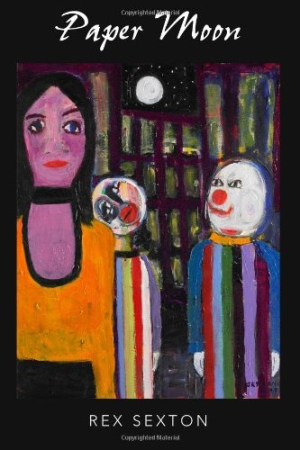Paper Moon
Renowned surrealist painter Rex Sexton is also a highly regarded writer, imbuing his fiction and poetry with the same startling vision and mastery he displays in his artwork. His newest novel, Paper Moon, dazzles with words, just as his paintings do with form and color.
Sexton tells the fictional tale of aspiring teenage artist and poet Ithiel Ingbar as he comes to grips with a transient lifestyle in the underbelly of Chicago during the 1980’s. The author checks in on the course of Ingbar’s life intermittently over the next twenty-five years, concentrating on brief, pivotal moments. Displaying a dramatic flair for the poetic, Sexton produces images as vivid as dreams and often as feverish as nightmares, all in the course of describing “life noir” as lived by Ingbar.
Graduating from a job shoveling coal in the train yards to “day labor slug” on museum security duty—not for the money, but for the art-school scholarship that comes with the job—Ingbar observes life at its darkest and most bizarre. Social commentary swirls with wordplay as Sexton reveals the seedier side of life, that place somewhere between “nowhere and no way out.” Bruce Springsteen screams “Born in the USA” in the background while prophetic words written on the wall of a jail cell fundamentally summarize the young man’s existence: “I walk among the lost … where chasms have no bridges over bottomless abysses.”
At twenty, Ingbar suffers a traumatic occurrence that has a lasting effect on both his psyche and the artwork he creates. Through his paintings and poetry, he examines his complicated history and circumstances, seeking to understand life’s enigmas. His art becomes that previously missing bridge connecting reality and fantasy. Existentialism battles theological doctrine. Sometimes confusion reigns; at times, lucidity prevails. The subconscious mind that comes alive in Ingbar’s dreams makes its way onto his paper and canvas in what Sexton calls a “mindscape of amazing grace.” “Artists live where all dreams end,” he says. “Truth, Illusion, are a dance of apparitions. You try to capture them. Smoke and mirrors are what you usually get—but sometimes life’s magic.” It is impossible not to consider the autobiographical nature of the author’s statement.
Sexton creates a dizzying madhouse of a world that exists beneath the surface of “normal” life. The topic itself feels unfiltered and raw, yet the presentation is remarkably precise. The descriptions are extremely visual, and the cadence so perfect sometimes that passages beg to be read out loud. Fans of Coleridge and Blake will not miss the allusions and undercurrents, and those who grew up in the Catholic Church will recognize the source of certain of Ingbar’s private hauntings. Sexton is both clever and creative, and Paper Moon is refreshingly intense, unusual in its complexity, and disquieting in its revelations.
Reviewed by
Cheryl Hibbard
Disclosure: This article is not an endorsement, but a review. The publisher of this book provided free copies of the book and paid a small fee to have their book reviewed by a professional reviewer. Foreword Reviews and Clarion Reviews make no guarantee that the publisher will receive a positive review. Foreword Magazine, Inc. is disclosing this in accordance with the Federal Trade Commission’s 16 CFR, Part 255.

